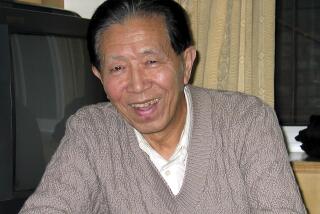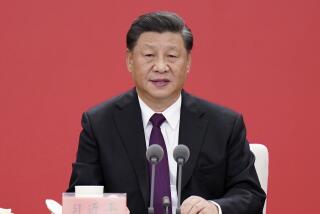If the Truth Be Told: A Chinese Proverb : Party Chief, at News Conference, Aims an Ironic Blast at Press
- Share via
BEIJING — Communist Party General Secretary Jiang Zemin, speaking at a news conference today in the Great Hall of the People, showed not the slightest sense of irony when he quoted a phrase that he intended as an attack on the foreign press.
“There is a proverb: ‘What is false will turn into truth after being repeated 1,000 times,’ ” Jiang said in criticism of foreign reporting on this spring’s pro-democracy student demonstrations and the suppression of the protests on the night of June 3-4 by martial law troops.
Throughout the summer, the Chinese media have waged a massive propaganda campaign aimed at rewriting the history of that violent night, during which soldiers killed hundreds, perhaps thousands, of students and Beijing residents who sought to block the army’s path into the city. Videotapes showing massive destruction of military vehicles that actually took place during the daytime on June 4 have been broadcast on state-run television to justify the army violence of the previous night.
Jiang and his five colleagues on the powerful Politburo Standing Committee, in a rare appearance before the Chinese and foreign press, sought to present an image today of stability, self-confidence and continued commitment to economic reforms and openness to the world.
However, they avoided giving detailed answers to sensitive questions.
Jiang, when asked how many people have been arrested and how many executed in the continuing crackdown against dissent, declined to give figures or even address the specific question.
Jiang also declined to rule out the possibility of execution for some key protest leaders, even if they did not participate in any violent activities.
“We cannot substitute the party for the government or the judicial departments,” Jiang said, explaining his reluctance to comment on the possibility of executions. “China must be ruled by law.”
Song Ping, another member of the committee, similarly declined to address the question of how many members have been expelled from the Communist Party in punishment for supporting the student-led demonstrations. The seven-week-long protests, which had called for greater freedom of speech and press, better treatment of intellectuals and an attack on corruption, had won wide support in the party’s reformist wing.
Jiang responded curtly when asked if “the Tian An Men tragedy” could have been avoided.
“First I’d like to correct you in using the word ‘tragedy,’ ” Jiang replied. “We feel it wasn’t a tragedy. We hold that it was a counter-revolutionary rebellion aimed at opposing the leadership of the Communist Party and overthrowing the socialist system.”
Jiang agreed with a comment several weeks ago by senior leader Deng Xiaoping, who declared that the “turmoil which later developed into a counter-revolutionary rebellion” was caused by a convergence of international and domestic trends, and was therefore “unavoidable.”
Premier Li Peng listed several causes of this spring’s disturbances.
“We had not made enough efforts to counter and combat bourgeois liberalization,” he said. “Bourgeois liberalization” is a code word for the spread of Western concepts of democracy and civil liberties.
Li also blamed the turmoil on former General Secretary Zhao Ziyang, who has been accused of splitting the party and supporting the protests.
Jiang said that Zhao, who was ousted in the wake of the demonstrations, is still “leading quite a comfortable life.” He said that the “consistent policy” of the Communist Party is that when a high leader makes mistakes, “his living conditions should not be affected.”
“Comrade Zhao Ziyang has a longer record in serving the party, so I think he enjoys better life treatment than I do,” Jiang said. “For example, his salary is higher. . . . We adopt a down-to-earth attitude to Zhao Ziyang. He did something beneficial, but also erred in implementing concrete policies.”
Qiao Shi, the Politburo member believed to be responsible for domestic security matters, defended the punishment meted out to people arrested since June 3.
“Among those people punished were a number of serious criminals found guilty of beating, smashing, looting, burning and killing,” Qiao said. Those sentenced to death were found guilty in courts after due process, he said.
Vice Premier Yao Yilin, who often is viewed as one of the leaders least committed to market-oriented reforms, appeared to read from a prepared document as he pledged that reforms will continue. Yao said that efforts will continue to improve the environment for foreign investment, especially in coastal areas, and that private enterprises will be allowed to continue to develop. He indicated, however, that there may be new government policies in such areas as taxation that may affect private and small rural enterprises.
More to Read
Sign up for Essential California
The most important California stories and recommendations in your inbox every morning.
You may occasionally receive promotional content from the Los Angeles Times.













